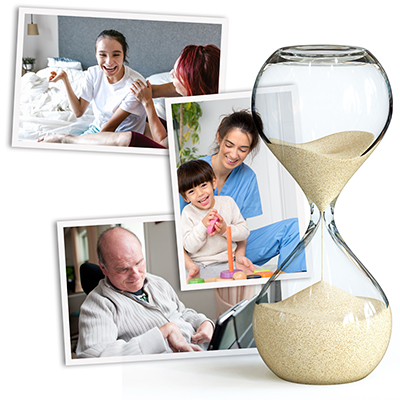Blog
What Is the Average Life Expectancy for Children With Cerebral Palsy?

Families with children suffering cerebral palsy often wonder, “How long do people with cerebral palsy live?” Most children with cerebral palsy can have a long, productive life with the right care and treatment. This, of course, means they may need more medications, therapies, and medical interventions than children without it. For kids with cerebral palsy, life expectancy can vary greatly depending on the severity of the condition.
How Cerebral Palsy Progresses
It’s essential to note that cerebral palsy doesn’t progress over time. However, the health issues accompanying CP are prone to progression, including these conditions that may impact the quality of life:
- Behavioral and cognitive issues
- Constipation and gastric reflux
- Joint and spine problems
- Movement and spasticity difficulties
- Oral motor problems
- Respiratory problems
- Seizures
- Vision and hearing problems
None of these issues will necessarily lessen the lifespan of someone with cerebral palsy. However, it does mean parents should be diligent with medical care and treatments.
Optimizing Your Child’s Lifespan
Remember, as a guardian or parent, you have a critical role in the quality of life and lifespan of your child. While medical professionals can provide appropriate treatment plans, it’s personal caregivers who typically spend the majority of the time with the child and get to know their needs, wants, and personalities.
Every child with CP has individualized needs, both emotionally and physically. Working closely with your child’s healthcare team and keeping these tips in mind can help optimize the lifespan for someone with cerebral palsy:
- Work with your child’s healthcare team to develop goals and expectations.
- Begin medical treatments and therapies as soon as possible.
- Become educated about your child’s condition and aware of any life-threatening or severe complications by watching for warning signs and early symptoms.
- Work with behavioral therapists to help your child develop coping strategies for successfully dealing with daily stressors.
Factors Affecting CP Life Expectancy
Learning about the primary factors affecting the lives of children with CP can help you better understand the condition and determine what needs to happen to help them live as long as possible.
Feeding Problems
Some children with CP have feeding difficulties. Those who can self-feed usually have a longer life expectancy than children who can’t. Children who need to rely on others for snacks and meals are more prone to aspiration and choking due to not being able to chew and swallow correctly.
Feeding tubes are sometimes recommended for children who are at risk of choking while eating. Without proper care, feeding tubes can lead to serious infections, so it’s essential to work closely with medical professionals who can regularly check your child’s feeding tube.
Feeding therapists and dietitians can help caregivers measure nutritional intake and show you methods that can reduce the chances of aspiration or choking.
Seizures
Not all children with cerebral palsy develop seizures. However, those who do may have a reduced life expectancy, as they may affect vision, level of consciousness, and muscle control. Prolonged seizures increase the risk of aspiration and low oxygen levels, which may have a negative impact on overall health.
Neurologists specializing in children with CP can help parents and caregivers watch for signs a seizure may be beginning and prescribe medication that may decrease the number or severity of them.
Cognitive Issues
Not all children living with cerebral palsy will have cognitive disabilities; in fact, less than 50% likely will. Children experiencing cognitive issues may have difficulties interacting effectively with peers, hearing, and forming words correctly. Experts believe these cognitive issues can play a significant role in reducing the life expectancy of kids with cerebral palsy.
Limited Mobility
The more limited a child is with moving and walking, the more dependent they are on others. While lesser forms of mobility restrictions usually don’t affect CP life expectancy, children experiencing quadriplegia and other more severe mobility issues have the potential for a lower survival rate. Massage therapy is sometimes recommended to help decrease spasms in muscles not being used enough and to keep blood flowing properly.
Vision Problems
Children with CP that have vision problems can run the risk of a reduced lifespan. However, it’s currently unclear if this is due to vision problems themselves or other factors like brain damage to a specific area. Ophthalmologists can work with you to find the right treatment plan for any vision problems your child may be experiencing.
While treatment and therapy advances continue to be made, CP continues to have a significant financial and emotional impact on those affected and their families. If you believe your loved one’s cerebral palsy is the result of medical negligence or malpractice, you may be eligible for compensation.
The Cerebral Palsy Family Lawyers at Janet, Janet & Suggs, LLC have helped more than 30,000 families across the country with their cases. With our medical and legal expertise, along with years of courtroom experience, we can help uncover the truth and work for the compensation our families are entitled to. Contact us today and let us help you seek justice.

Claire Surles, RN
Registered Nurse
Claire comes to JJS after a 10-year career as a labor and delivery nurse. She dedicated her hospital efforts to advocating for families, providing the safest birthing environment possible as Newborn Admission Nurse at UMMC St. Joseph Medical Center in Towson, Maryland. Her passion for helping those who experienced losses at any stage of gestation led to her appointment as Coordinator of the hospital’s ROOTS perinatal loss program. READ FULL BIO
